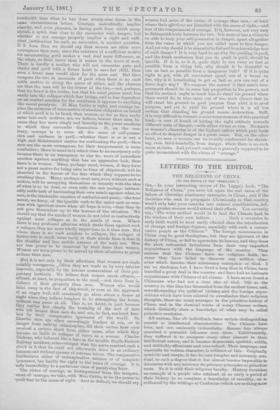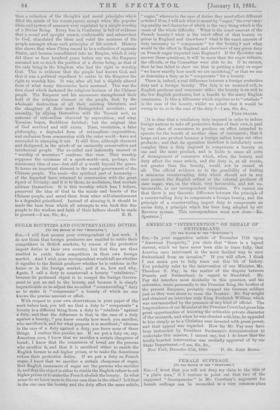LETTERS TO THE EDITOR.
THE RELIGIONS OF CHINA.
To THE EDITOR OP THE "SPECTATOR.")
Sfa„—In your interesting review of Dr. Legge's book, "The Religions of China," you have hit upon the real cause of the failure of Christian missionary enterprise in China ; and if the Societies who seek to propagate Christianity in that country would only take your remarks into serious consideration, infi- nitely greater success would attend their efforts. You correctly say, "The wiser method would be to lead the Chinese back to
the wisdom of their own fathers Such a reversion to early faith would be more easily effected than the introduction of strange and foreign dogmas, especially with such a conser- vative people as the Chinese." The foreign missionaries in China may be good theologians, but they are ignorant of the history of China, or fail to appreciate its lessons, and they draw the most unfounded deductions from their very imperfect acquaintance with the language of the country. They assume that the Chinese have no religious faith, be- cause they have failed to discover any written char- acter which denotes their missionary conception of God. I am no siuologue, but I have lived a long time in Ching; have travelled a great deal in the country, and have had an intimate acquaintance with Chinese of all classes. I have never found a Chinaman who had not a clear idea of God. Old as the country is, this idea has descended from the earliest times, and notwithstanding the political idolatry and the foreign super- stitions which have been allowed to overshadow their religious thoughts, there are many passages in the primitive history of China, and in the classical works of many Chinese writers, which distinctly show a knowledge of what may be called primitive revelation.
All nations, like all individuals, have certain distinguishing mental or intellectual characteristics. The Chinese have been, and are, eminently rationalistic. Reason has always
exercised a powerful influence over them. Unfortunately, they suffered it to overgrow every other element in their intellectual nature, and it became degenerate, egotistic, subtle, and childishly effeminate and over-refined. Their language, and especially its written character, is evidence of this. Originally symbolic and simple, it has become complex and intensely arti- ficial, to such a degree that it has almost become impossible to determine with any accuracy its primary principles or primitive roots. So it is with their religious faculty. History furnishes no example of a people who attained at so early a period of their history to so complete a knowledge of morality, as is evidenced by the writings of Confucius (which are nothing more
than a collection of the thoughts and moral principles which filled the minds of his countrymen), except when the popular ideas and system of manners were regulated by a simple worship of a Divine Being. Every line in Confucius is full 'of evidence that a sound and upright reason, conformable and subservient to God, stimulated the ideas and ruled the manners of the people amongst whom such principles of life existed, History also shows that when China ceased to be a collection of separate States, and became consolidated into an Empire, which it only did three or four hundred years before our era, the Emperor assumed not so much the position of a divine being, as that of the only being in the kingdom who had the right to worship God. This is evidence that the people had known God, and that it was a political expedient to centre in the Emperor the right to worship him. It was, after all, but a slightly altered from of what many theocracies have assumed. This was the first cloud which darkened the religious horizon of the Chinese people. The Emperor and his successors strengthened their hold of the religious element in the people, first, by the wholesale destruction of all their existing literature, and the slaughter of their most distinguished moralists ; and secondly, by allying themselves with the Taouist sect, an outcome of rationalism obscured by superstition ; and what Taouism began, Buddhism finished ; but the original idea of God survived and still exists. Time, revolution, a false philosophy, a degraded form of rationalism—superstition, and exclusion from communion with the outer world—have not succeeded in stamping it out. It still lives, although obscured and disfigured, in the minds of an eminently conservative and intellectual people. The so-called and indecently sneered at " worship of ancestors " confirms this view. That worship supposes the existence of a spirit-world—not, perhaps, the missionary idea of one—but still of a world beyond the grave. It forms an important element in the moral government of the Chinese people. The souls—the spiritual part of humanity— of the departed have returned to communion with the great Spirit of Divinity, and it is to them, as mediators, that mortals address themselves. It is this worship which has, I believe, preserved the idea of God in the minds and hearts of the Chinese people, and saved them from utter self-abandonment to a degraded priesthood. Instead of abusing it, it should bo made the base from which all attempts to win back this fine people to the wisdom and faith of their fathers should be made



































 Previous page
Previous page